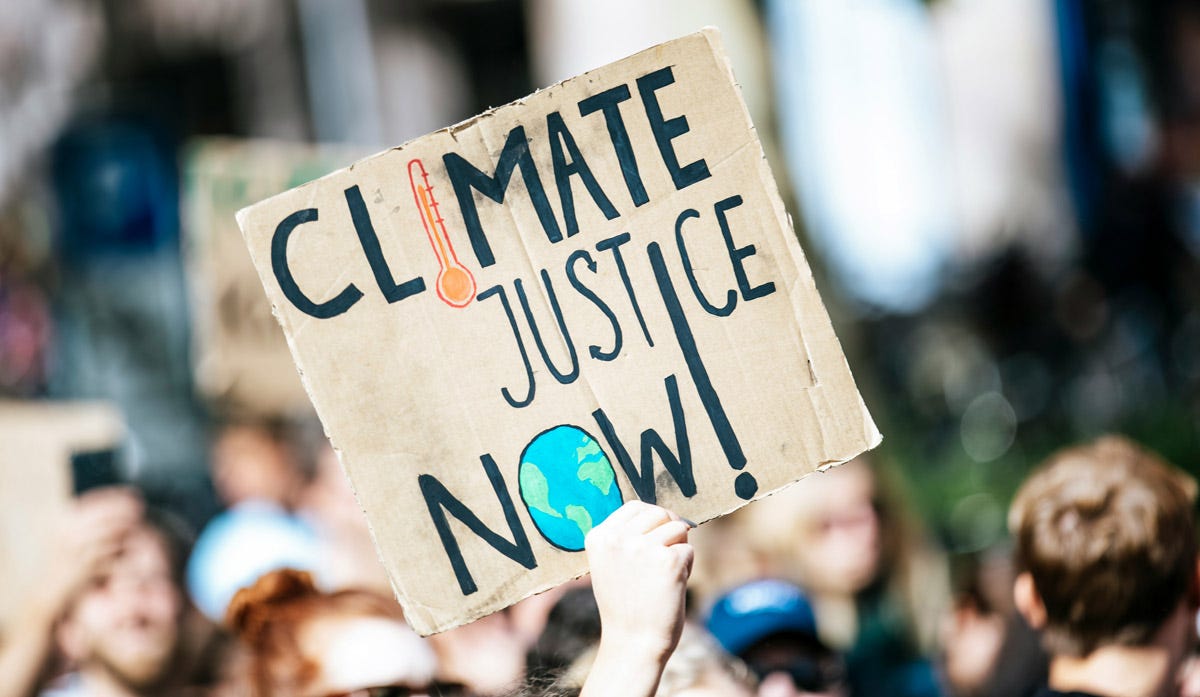Why Journalism Matters
We're back. Time to learn about the 89 per cent project and Trump's war on journalism. Also journalists take legal action over freedom of information requests from Musk's DOGE
4 minute read
89—2025’s big number about a journalism campaign for climate action around the world
April sees the launch of a unique and compelling journalistic project which aims to transform the impact of climate change on public consciousness around the world.
In the week that coincides with Earth Day on April 22 The Covering Climate Now consortium of major journalistic outlets around the world launched the The 89 Percent Project—a year-long global journalistic effort based on the widely researched data that an overwhelming majority of the world’s people want their governments to take stronger action to fight climate change.
The recognition of this majority support is important because as CCN comments:“This global climate majority, however, does not realise it is the majority; most people think their fellow citizens don’t agree.”
As can be seen from the scientific studies behind the 89 Percent project, the 80 to 89% figures are global averages. The support for strong climate action varies by country—for example, the figure is 87% in Japan, 74% in the US, 80% in India — suggesting that support also varies by age, gender, political affiliation, economic status, and so forth.”
A primary goal of the Joint Coverage Week is for participating journalists and outlets to collectively generate enough coverage that news of the 89% breaks through. And that the global public learns that this potentially game-changing climate story has been hiding in plain sight.
CCN says that the current situation also reflects important deficits in democratic accountability., The relative inaction of the world’s governments in the face of the overwhelming evidence of climate change is ascribed, in part, to their lack of recognition of the fact that the vast majority of their citizens want this problem solved.
Solutions are at hand
Another major issue is that the public in general do not realise that the solutions to the crisis are both known and at hand.
CCN comments: “Scientists have long said that humanity already possesses all the tools and know-how necessary. Here, stories can explore what those tools and know-how are, including not only the technological solutions, such as solar and wind power, but also the political ones, including voting, protests, and other forms of activism.”

“How do these tools and know-how work in practice, and who are the people, government agencies, businesses, and others putting them into practice, both in a given news organization’s home community and around the world?
“A foundational point to get across here is that the fundamental solution to the climate crisis is a rapid global phase-out of fossil fuels (and other climate-destructive activities, starting with deforestation). Also, stories can emphasise the centrality of climate fairness, both in terms of rich countries and individuals paying for the damage they are causing and the need for “just transitions” away from fossil fuels for workers and communities that historically relied on them.”
Why not?
And finally –in the face of the support given by the world’s people and the solutions that are manifestly available--the questions must be asked about what is holding things up?
“If humanity has the solutions, and the overwhelming majority of people want governments to implement those solutions, why isn’t it happening? Here, accountability journalism can identify the obstacles that have kept governments from doing what’s needed.
“Stories can highlight how fossil fuel interests have for decades deceived and delayed. (Here journalists must remember that most of the public remains unaware of the industry’s many decades of lying.) Coverage can update this perspective by examining how fossil fuel interests today use disinformation, electoral campaign contributions, and other methods to blunt climate progress.”
The hope is that over the coming year the 89 per cent majority will become common public currency and that will act as a spur for action for governments and fossil emission industries around the world.
Good journalism will play a major role in making that happen.
This story is part of The 89 Percent Project, an initiative of the global journalism collaboration Covering Climate Now.
Reference
4 minute read
Taking up arms against Trump’s ongoing war on journalism

“The day-to-day chaos of the American political news cycle can make it hard to fully take stock of the seismic shifts that are happening. But when you step back and look at the whole picture, the pattern of blows to press freedom is quite clear.
“RSF refuses to accept this massive attack on press freedom as the new normal. We will continue to call out these assaults against the press and use every means at our disposal to fight back against them
“…Donald Trump wants to make this about him versus the press. In reality, this fight is about Donald Trump versus every American’s First Amendment rights.”
Clayton Weimers
Executive Director, RSF North America
As we approach World Press Freedom Day, celebrated every year on May 3, the Paris based press champion Reporters sans frontières (RSF) has shone a spotlight on Donald Trump’s unprecedented and far reaching assault on journalism and the press.
After more than 100 attacks against journalists during the latter stages of his election campaign, he has now turned his threats into action as summarised in RSF’s recent review:
“”He launched baseless investigations into public and private broadcasters, ordered government agencies to cancel their news subscriptions and removed access to thousands of government web pages.”
Moreover, In a truly chilling move, Trump targeted the historic and respected Associated Press news agency for failing to recognise the president’s unilateral declaration that the Gulf of Mexico should now be called the Gulf of America.
Consequently, in February, the administration barred two AP reporters from covering White House events in what RSF calls a ‘flagrant violation of the First Amendment, demanding that AP be given back its full ability to cover the White House’.
In response to these punitive actions The Associated Press issued this statement from Executive Editor Julie Pace:
“As a global news organisation, The Associated Press informs billions of people around the world every day with factual, nonpartisan journalism.
“Today we were informed by the White House that if AP did not align its editorial standards with President Donald Trump’s executive order renaming the Gulf of Mexico as the Gulf of America, AP would be barred from accessing an event in the Oval Office. This afternoon AP’s reporter was blocked from attending an executive order signing.
“It is alarming that the Trump administration would punish AP for its independent journalism. Limiting our access to the Oval Office based on the content of AP’s speech not only severely impedes the public’s access to independent news, it plainly violates the First Amendment.”
Executive Order
At the same time, in an act of twisted Orwellian irony the president signed an executive order “restoring freedom of speech “ which proclaimed“It is the policy of the United States to ensure that no government officer employee or agent engages in or facilitates any conduct that would unconstitutionality abridge the free speech of any American citizen.”
Although many readers may never have heard of US Agency for Global Media USAGM, it is estimated that 427 million people around the world rely on the news and information it makes possible.
The Trump Administration has announced its intention to close down the Agency and terminate its operations, but its initial attempts to dismiss staff and stop funding for operations has been stopped by a federal judge who ruled that the actions taken by the government violated the law and the American constitution.
AS RSF USA comments:
“In an effort to eliminate the US Agency for Global Media (USAGM) by cutting grants to outlets funded by the federal agency and placing their reporters on leave, the government has left millions around the world without vital sources of reliable information.
“This leaves room for authoritarian regimes, like Russia and China, to spread their propaganda unchecked.”
Since the initial executive order, a federal judge has ruled that closing USAGM is illegal and a violation of the constitution and ordered a reversal of the actions taken against it.
In other actions taken by the Trump administration as compiled by RSF:
Trump has made 64 disparaging comments about the media on his truth social platform since the inauguration.
Limits to reporting access: The administration is limiting journalists’ physical access to government information by restricting access to its pool reports and allowing ideologically-friendly content creators to apply for access to the White House and Pentagon, while ending the longstanding residencies of NBC News, The New York Times, National Public Radio, and Politico.
Contradictions on free speech: Despite claiming to be a “free speech absolutist,” Elon Musk called for CBS’s 60 Minutes staff to receive “a long prison sentence” for interviewing a critic of his policies.
On the plus side of the balance sheet, on February 12, in a bright moment of hope, the Trump administration secured an important win for press freedom by arranging a deal to free Radio Free Europe/Radio Liberty journalist Andrei Kuznechyk from prison in Belarus.
But otherwise there is no sign of a let up in the government’s attempts to undermine and discredit journalists and the established press.
Reference
RSF: Trump’s war on Journalism
3 minute read
Investigative journalists sue Musk and DOGE over Freedom of Information Requests

As the stories WJM has been telling over the past three years show, it is often only legal action (both national and international) and the work of activists and investigative journalists that serves to reveal and hold to account the authoritarian power of governments.
And so this is proving to be the case, in the face of the often arbitrary and unilateral exercise of power by the Trump administration. And no aspect of this power is proving more far reaching and threatening to democratic control than that wielded by Elon Musk and his Department of Government Efficiency.
(Although Musk has recently announced he is ‘stepping back’ from his government role, it is not known what formhis future involvement will take and what will happen to DOGE once he leaves.)
The American investigative outlet Intercept is taking the initiative by seeking Freedom of Information orders on DOGE and trying to enforce them by suing the government to make them comply. They are the first media outlet to take this action following legal interventions by various watchdog groups.
Despite promising ‘maximal transparency’ DOGE has refused all attempts to disclose and explain what it is doing. The Intercept is refusing to accept DOGE’s claim that it is not an ‘agency’ subject to FOI requests because of the way it was set up by presidential executive order.
In March, Intercept sued the government to make them comply. As Shawn Musgrave, a reporter and experienced media attorney explained: “The lawsuit, filed in Manhattan federal court under the Freedom of Information Act, concerns multiple FOIA requests for DOGE records. At first, DOGE simply ignored these requests while Elon Musk’s crew ransacked federal agencies and accessed sensitive data systems.
“…DOGE sent a brief email to The Intercept claiming it was not subject to FOIA at all because of the way President Donald Trump established DOGE by executive order in January. “We therefore decline your request,” reads the unsigned email.
The Intercept’s lawsuit covers five different FOIA requests sent to DOGE since early March.
“[These include] requests for email communications, including correspondence from Musk himself and DOGE’s administrator, Amy Gleason, as well as emails between DOGE and members of Congress. The other two requests seek key records about DOGE’s structure and operations, such as data about its staffing and agreements between DOGE and other federal agencies.”
Making inroads
DOGE’s extensive actions, making inroads into federal agencies has brought attention to Musk’s own billion-dollar connections to government, primarily through his companies, particularly SpaceX.
As the Guardian reported earlier this year:
“Donald Trump has given Musk enormous power to reshape the government, including issuing an executive order that requires agencies to coordinate with Doge on staffing decisions and cuts.
“Musk’s influence in the White House also puts in peril the numerous federal investigations against his companies for a range of alleged wrongdoings that includes violating federal labor and securities laws. Trump has already dissolved one watchdog agency investigating Tesla. Government accountability groups have warned that Musk’s myriad of potential ethical conflicts and a lack of transparency around his actions in government carry the risk that he will use his power for political corruption.”
The Intercept has launched a funding campaign to help raise the money for their legal costs. See link below.
Reference
The Guardian on Musk’s conflicts of interests
It’s free to subscribe and you can cancel anytime, so give it a try!
Contact us on greatjournalismwjm@gmail.com
Follow us on Facebook and Twitter
facebook.com/whyjournalism matters
X-twitter @JournalismWhy





"Here’s just how important we thought that publishing the news was — even in our country’s infancy: The U.S. Congress provided the Continental Army with a printer so that Americans could receive bulletins about what was happening during the Revolutionary War." TGM:https://tinyurl.com/mw266pcz